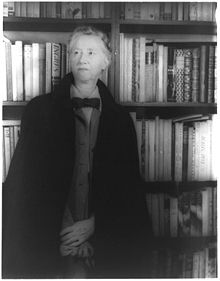Marianne Moore
| Marianne Moore | |
|---|---|

Photograph by Carl Van Vechten (1948)
|
|
| Born |
November 15, 1887 Kirkwood, Missouri, U.S. |
| Died | February 5, 1972 (aged 84) New York City, New York, U.S. |
| Occupation | Poet |
| Notable awards | National Book Award, Pulitzer Prize, Bollingen Prize, National Medal for Literature |
Marianne Craig Moore (November 15, 1887 – February 5, 1972) was an American Modernist poet, critic, translator, and editor. Her poetry is noted for formal innovation, precise diction, irony, and wit.
Moore was born in Kirkwood, Missouri, in the manse of the Presbyterian church where her maternal grandfather, John Riddle Warner, served as pastor. Her parents separated before she was born after her father, John Milton Moore, a mechanical engineer and inventor, suffered a psychotic episode; Moore never met him. She and her older brother, John Warner Moore, were reared by their mother, Mary Warner Moore. The family wrote voluminous letters to one another throughout their lives, often addressing each other by playful nicknames and using a private language.
Like her mother and her older brother, Moore remained a devoted Presbyterian, strongly influenced by her grandfather, approaching her Christian faith as a lesson in strength vindicated through trials and temptations; her poems often deal with the themes of strength and adversity. She thought "it was not possible to live without religious faith". Moore lived in the St. Louis area until she was 16. After her grandfather died in 1894, the three stayed with relatives near Pittsburgh for two years, then moved to Carlisle, Pennsylvania, where her mother found employment teaching English in a private girls' school.
In 1905, Moore entered Bryn Mawr College, and she graduated four years later with an A.B., having majored in history, economics, and political science. The poet H. D. was among her classmates during their freshman year. At Bryn Mawr, Moore started writing short stories and poems for Tipyn O'Bob, the campus literary magazine, and decided to become a writer. After graduation, she worked briefly at Melvil Dewey’s Lake Placid Club, then taught business subjects at the Carlisle Indian Industrial School from 1911 to 1914.
Moore's first professionally published poems appeared in The Egoist and Poetry in the spring of 1915. Harriet Monroe, the editor of the latter, would describe them in her biography as possessing "an elliptically musical profundity".
...
Wikipedia
